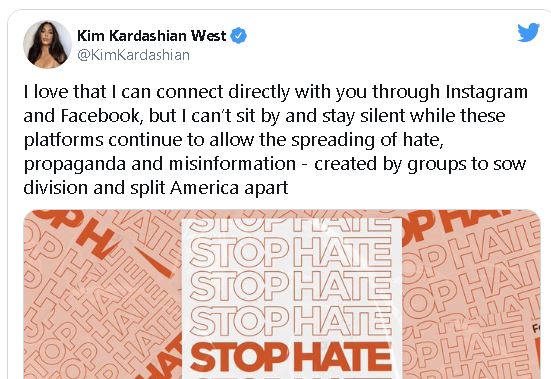FREE SPEECH UNDER CELEBRITY ATTACK
WILL THE FCC PROTECT FREE SPEECH?

Several well-known “celebrities” (some of whom might have been known as “hustlers” and “Jezebels” in an earlier time) are boycotting Facebook and Instagram today demanding even more censorship of what they consider “hate speech.”
Since the said platforms are already heavily censoring dissident voices who are warning the Public about misinformation regarding the Declared Pandemic, and overtly censoring political speech based on “independent fact checkers,” it is difficult to understand how much more censorship the celebrities expect.
Your reporter recently submitted formal Comments to the Federal Communications Commission (FCC) demanding an end to “private company” censorship of the Internet Commons.
This was in response to a Petition filed with the FCC by the Department of Commerce on behalf of the President. The Petition seeks protection for political speech during the election. For example, YouTube has banned advertising by a major political action committee (PAC) for 90 days, until just beyond the election, since “independent fact checkers” determined that the PAC, by quoting an opinion the President, was “misinforming” the users of that social media outlet.
My Comments to the FCC can be read here: http://www.inhere.org/wp-content/uploads/2020/08/Comments-FCC-Petition-11862.pdf
The points made in the Comments included:
ABSTRACT: Comments submitted on 7 August 2020 by Ralph Fucetola JD with reference to the Department of Commerce’s Federal Communications Commission Petition #11862 of 27 July 2020 seeking clarification of provisions of 47 U.S.C § 230.
— Acknowledging the recent actions of Twitter and Facebook to ban speech by President Trump allegedly determined to be “false” by “third party fact checkers” I am submitting these comments as a retired attorney at law with 36 years of practice.
— I am concerned with the actions of various social media companies in “banning” [a term that reminds me of the evils of Apartheid] various persons, including President Trump, for political speech.
— The apparent coordinated “bannings” of various speakers, including, for example Alex Jones (who was banned by several social media companies during one 24 hour period in late September, 2018) suggest unlawful conspiracy by the companies in their use of the Internet Public Utility or Public Commons.
There is a clear and present threat to Free Speech posed by online media outlets that are “private companies” but not private actors, as they are acting over our Internet Commons and are heavily interconnected with Deep State operations. These “private companies” are as much government censors of Free Speech in modern America as, say, the private Tax Farmers of ancient Rome were government tax collectors in that empire.
Social media censorship is just that, censorship, and as the media companies are “creatures of the state” benefiting from their corporate franchise status, they must be held to the same restrictions on censorship that restrict their government sponsors.
Here is what FCC Commissioner Carr said about the Section 230 petition:
“Section 230 confers a unique set of benefits on social media companies and other ‘providers of interactive computer services.’ It gives them special protections that go beyond the First Amendment rights that protect everyone in this country. Congress passed this provision back in the 1990s to address the limited content moderation practices employed by Internet sites like the then-popular Prodigy and
CompuServe messaging boards. In doing so, Congress sought ‘to encourage the development of technologies which maximize user control over what information is received’ and to ‘preserve the vibrant and competitive free market that presently exists,’ as several of Section 230’s provisions state.Empowering users to engage in their own content moderation is thus at the core of Section 230. [Emphasis added.]
Flash forward over 20 years, and the content moderation practices employed by the Internet giants of today bear little resemblance to the activities Congress had in mind when it passed Section 230. And there is bipartisan support for reforming Section 230. Yet the federal government has provided virtually no guidance on how the unique and conditional set of legal privileges Congress conferred on social media companies should be interpreted today.
“The Section 230 petition provides an opportunity to bring much-needed clarity to the statutory text. And it allows us to move forward in a way that will empower speakers to engage in ‘a forum for a true diversity of political discourse,’ as Congress envisioned when it passed Section 230.”
https://docs.fcc.gov/public/attachments/DOC-365764A1.pdf
What can you do? Let the FCC know that you support a review of Section 230 of the Telecommunications Act, which protects social medial outlets from liability for what their users post. This law was supposed to protect Free Speech but has clearly not worked or needs stronger enforcement.
Comment here: https://www.fcc.gov/ecfs/filings/express — you will need to enter the Proceeding Number which is RM-11862.
